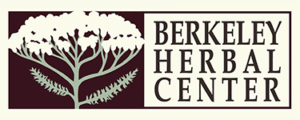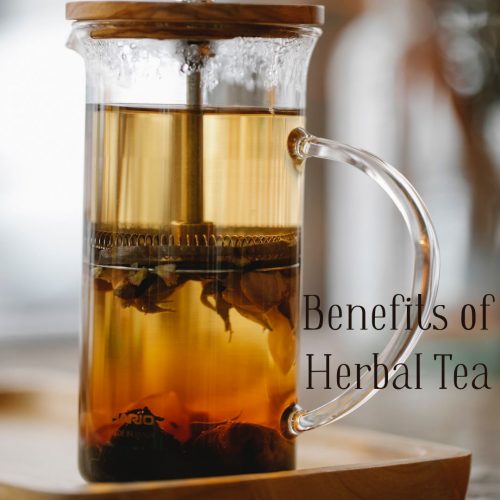
When most folks think of “herbal medicine” they think of flowers and roots hanging around a cellar lined with little brown jars of elixirs and potions. The potions and magic is a beautiful vision but one of the best, most effective medicines is the simplest: teas! The benefits of herbal tea have been touted for as long as we have been keeping records of how we take care of each other.
We will be the first to tell you that most herbal medicines have a very strong taste – one that most people do not particularly like. That is what makes using tea for medicine so special: it tastes fantastic.
Taste is a huge aspect of compliance. For someone new to herbal medicine, a tincture or a syrupy cordial can be too intense. It can make them dread taking it several times a day. Tea removes that issue entirely because it is easy to make yummy for folks that are sensitive to taste.
Is herbal tea as effective as other medicines? Usually! This surprises people but most healing constituents are water-soluble. You can absolutely create herbal teas that have very real benefits for the drinker.
And here is pro tip: if you have an herb that has fat-soluble constituents you want to work with, like the Golden Milk Ingredients, just add a little fat like coconut oil or cream to your tea while it is brewing.
Just. Add. Water. That is herbal tea making in a nutshell. Of course every medicinal tea has its own preparations and steeping time, but once you know your recipe, you really just need to add hot water. Or in some cases, cold water.
Most people are walking around 24 hours a day dehydrated! Your body is roughly 80% water so helping our kidneys keep our bodies balanced and hydrated is vital to our health. Consistent sipping helps keep the body happy.
Tea is especially helpful when it comes to working with the systems of elimination. While a tincture can help improve organ function, they are typically made with alcohol, which dehydrates our cells. We need to be well hydrated to move most toxins out so working with a tea can hydrate and heal those organs at the same time.
To make sure that you get all the benefits of your herbal tea there are a few things to pay special attention to.
A tea brewed just for flavor often has a brewing time of less than 3 minutes. If you are using the tea for medicinal benefits, you want to steep it for a bit longer. Unless otherwise noted in your recipe, your brewing time is primarily going to depend on the herbs themselves.
Leaves and flowers are light and have thin cell walls. They will typically release their healing properties within a few minutes of steeping. For just leaves and flowers, 3-5 minutes is usually sufficient for tea. For a stronger infusion 10-20 minutes is enough.
With a root or a bark, expect a longer brewing time. They have thicker cell walls and need to have a sufficient amount of time in the water to release their medicinal properties. For most roots and bark teas try it starting with 5 minutes in very hot water. For a strong decoction of just roots, you will find recipes that suggest simmering for an hour or two!
Like with brewing time, brewing temperature depends on your herbs. For the most part, we do not suggest using boiling water to make tea. Antioxidants are sensitive to heat and can be destroyed by boiling water, reducing the overall effectiveness of your formula.
Leaves and flowers are quite a bit more sensitive to temperature than roots are. If you are using just leaves and flowers, boil your water, let it cool for 5-7 minutes, then pour over your herbs.
You can be less cautious with roots and barks because they are hardier and more reluctant to release their constituents. Though boiling would be too much, many root-based recipes call for gentle simmering.
If you have a mix of roots, barks, leaves, and flowers, err on the side of caution with a lower brewing temp for a longer time. It will produce a fuller flavor and keep all the benefits.
For a stronger medicine, split up your herbs. Simmer the hardy ones and then pour that (cooled) over your sensitive herbs and let it sit for 10 minutes. Note: this is likely to be VERY strong.
Many leaves and flowers, and even some roots, extract beautifully in room temperature water. Holy basil, chamomile, and marshmallow root are just a few examples of herbs that make a lovely tea using the cool water method. Brewing time is longer – up to overnight – but the flavor of a cold-brewed tea is often gentler and more delicate than a hot infusion.
When you are brewing to extract the benefits of herbal tea, you have to pay attention to the herbs you are working with. Do not just search for herbs that work with your specific condition, study the whole plant and its essence before working with it medicinally.
Remember: All the constituents of the plant are in your tea, not just the ones you want.
Make sure you are looking at things like contraindications and reactions with other plants or body types. If you are not comfortable with formulating your teas yet, connect with an herbalist.
This recipe for herbal tea is simple to make, easy to source, and offers a ton of benefits to any drinker.
This tonic tea works as a preventative and also helps with most stomach upsets, nervousness, headaches, stress, sore throat, sleeplessness, and general malaise. It is lovely to drink after dinner to help wind down and digest, it is safe for most people – including children, and it goes down easily.
Servings:
Keep in mind that making a single cup of medicinal tea takes roughly one tablespoon of tea per 8 ounces of water.
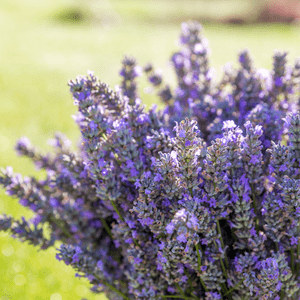
Lavender is an oft-sung hero of herbalism because it is so safe, tasty, and healing that you cannot go wrong.
In this recipe, lavender is going to be a prominent flavor and a bit bitter because of the extended steeping time (don’t worry, it’s a balanced recipe, we promise). That allows it to release its medicine and have a stronger relaxing impact, relieve indigestion that sits up high in the body, and help with headaches caused by tension.
While lavender is not a true sedative, it is quite calming and helps you connect with yourself. If you are stressed or overtired, the strength of lavender in this tea can remind your body that it needs rest. Listen to yourself.
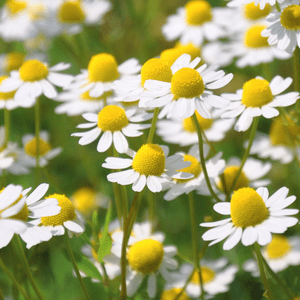
Chamomile is another gentle giant in the herb world. So much so that many herbalists will suggest a simple suspended cold infusion of the herb to help with most issues. It is sweet and a little bitter and it loves to grow where things are crowded, so it helps fill out the parts of you that need some extra love.
In this recipe, chamomile offers its sensitivity to your stomach issues, helps your kidneys remove toxins and balance out your body’s water levels. It helps bring the whole formula together so that you can experience all the benefits of this herbal tea.
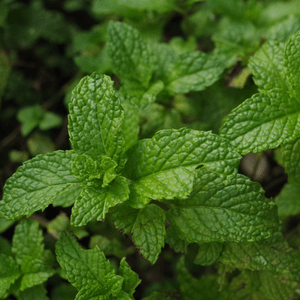
For a little cooling and carminative action, mint is your best ally. Not only is it super easy to grow for yourself, it is a delicious tonic that adds a bit of mental clarity to every cuppa.
You will find this tea offers a pleasant post-meal stomach settling. For days that you are feeling a little under the weather, mint will help stimulate your body to move out whatever ails you – from a little chest cold to intestinal distress to an infection.
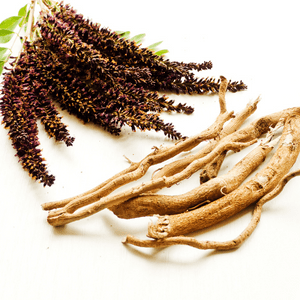
Only half as much licorice is used in this tea, compared with the others, because it comes with quite a strong sweet flavor that can overpower the other herbal allies. It is also the only root, so this ingredient takes a bit longer to release its healing properties in hot water (thus the longer brewing time) but it holds more flavor in its smaller quantity.
Licorice is demulcent and in this tea it adds a little bit of soothing to the throat. David Winston and Steven Maimes talk about licorice as an adaptogen in their co-authored book, Adaptogens; Herbs for Strength, Stamina, and Stress Relief. They suggest that licorice offers an additional little boost to your immune system and can bring some stress relief.
Did you make this tea? Let us know in the comments below!
Herb Books to Check Out for Medicinal Tea Making:
Adaptogens; Herbs for Strength, Stamina, and Stress Relief by David Winston and Steven Maimes
Grow it, heal it: Natural and effective herbal remedies from your garden or windowsill. By Christopher Hobbs & Leslie Gardner
Healing Herbal Teas: A Complete Guide to Making Delicious, Healthful Beverages. By Brigitte Mars
Support Our Work
Berkeley Herbal Center is a 501(c)(3) organization, so all donations are tax deductible. Tax ID #14-1975183
If you would like to donate by check or cash, please send an envelope addressed to:
Berkeley Herbal Center
1250 Addison St., #G
Berkeley, CA 94702
